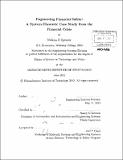Engineering financial safety : a system-theoretic case study from the financial crisis
Author(s)
Spencer, Melissa B. (Melissa Beth)
DownloadFull printable version (5.986Mb)
Alternative title
System-theoretic case study from the financial crisis
Other Contributors
Massachusetts Institute of Technology. Technology and Policy Program.
Advisor
Nancy G Leveson.
Terms of use
Metadata
Show full item recordAbstract
There is currently much systems-based thinking going into understanding safety in complex socio-technical systems and in developing useful accident analysis methods. However, when it comes to complex systems without clear physical components, the techniques for understanding accidents are antiquated and ineffective. This thesis uses a promising new engineering-based accident analysis methodology, CAST (Casual Analysis using STAMP, or Systems Theoretic Accident Models and Processes) to understand an aspect of the financial crisis of 2007-2008. This thesis demonstrates how CAST can be used to understand the context and control problems that led to the collapse and rapid acquisition of the investment bank Bear Stearns in March 2008. It seeks to illustrate the technological and regulatory change that provided the context for the Bear Stearns accidents and then demonstrates how a top-down systematic method of analysis can produce more insight into the accident than traditional financial accident investigations such as congressionally-mandated inquiries.
Description
Thesis (S.M. in Technology and Policy)-- Massachusetts Institute of Technology, Engineering Systems Division, Technology and Policy Program, 2012. Cataloged from PDF version of thesis. Includes bibliographical references (p. 103-105).
Date issued
2012Department
Massachusetts Institute of Technology. Engineering Systems Division; Technology and Policy ProgramPublisher
Massachusetts Institute of Technology
Keywords
Engineering Systems Division., Technology and Policy Program.